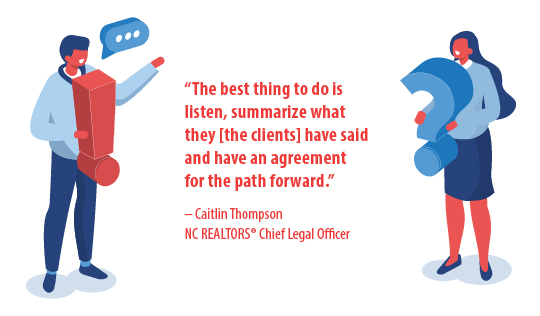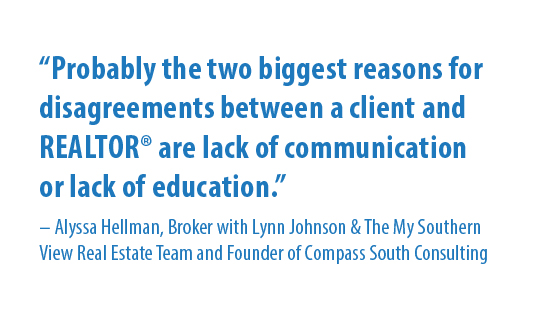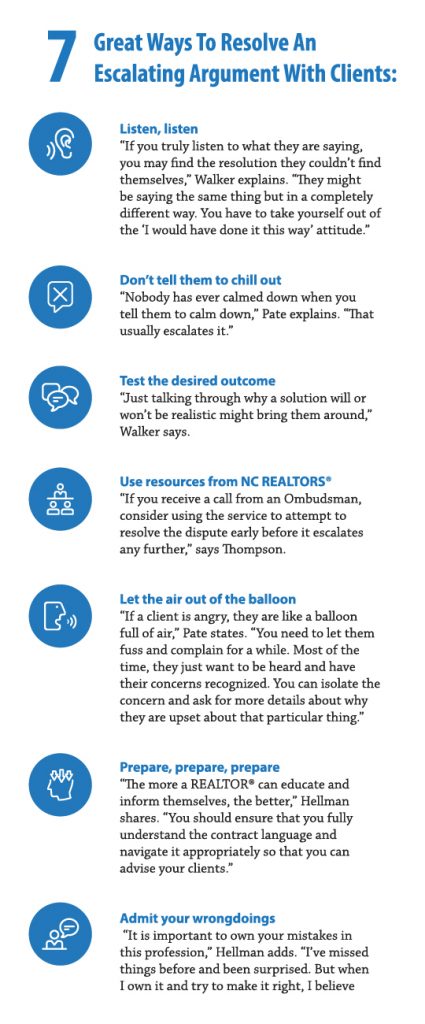Brilliant Steps to Defuse Arguments with Clients

Two years ago, Stephanie Walker dealt with a client selling her home. The closing got delayed a couple of times. The buyers scheduled another home inspection after the first one was completed to find more problems they could use in negotiations.
“The seller felt like she was ramrodded into fixing things she didn’t want to fix,” says Walker, broker/owner of Stephanie Walker & Associations in Kitty Hawk. She also does mediation and Ombudsman trainings for NC REALTORS®.
“She’d call and just yell. She didn’t have to fix those things, and those people didn’t have to buy her house,” Walker states.
Eventually, her home sold.
“I think she just needed to be heard,” Walker explains. “I knew her frustrations weren’t at me. It was much more about the situation. She was very privileged and used to getting her way.”
 REALTORS® run into difficult clients and other agents all the time. But learning the right scripts and attitudes to positively resolve disputes can help your business and give you a stronger reputation among potential clients and those you face across the table.
REALTORS® run into difficult clients and other agents all the time. But learning the right scripts and attitudes to positively resolve disputes can help your business and give you a stronger reputation among potential clients and those you face across the table.
How Far Is Too Far When Clients Go Awry
“Probably the two biggest reasons for disagreements between a client and REALTOR® are lack of communication or lack of education,” says Alyssa Hellman, broker with Lynn Johnson & The My Southern View Real Estate Team and founder of Compass South Consulting in Raleigh.
“Buying or selling a home is often an emotionally charged experience, and so, it is only natural to have emotions about their experience,” she explains. “I normally welcome that and try to understand the why of what they’re feeling and help navigate the situation through that lens.”
“Keep in mind, as a REALTOR®, you’re in the middle of buyers and sellers, so you’re often their only outlet to share frustration, dissatisfaction and more,” Hellman explains. “So, as long as they understand that you’re on their side and advocating on their behalf, you can normally avoid the ranting and raving.”
However, it does happen. Brian Pate has had it happen a few times in his long career.
“One time, a client cussed at me. That is one thing I will not tolerate,” says Pate, owner of Pate Realty Group at Keller Williams Preferred Realty in Wake Forest. He also is president and owner of Brian Pate Seminars.
Hellman agrees that disrespectful language or actions simply are unacceptable. When should a REALTOR® walk away or fire their client? Hellman is a big believer that you have to be the one who determines the level of respect that you’re given.
 “I would not accept feeling threatened, unsafe or disrespected, nor do I believe any other professional should. But ultimately, folks have to decide this for themselves,” Hellman reveals.
“I would not accept feeling threatened, unsafe or disrespected, nor do I believe any other professional should. But ultimately, folks have to decide this for themselves,” Hellman reveals.
Increase Communication To Avoid Disputes
“I jokingly say in my classes that no clients complain that I talked too much to them,” Pate adds.
Keeping the lines of communication open throughout the process of selling or buying a home remains top on the list of Pate’s teachings to other agents.
“The second most stressful thing, besides buying a home, is the death of a loved one,” he states. “As long as an agent communicates on a regular basis, that’s the key.”
Many people get frustrated with the negotiations of house buying and selling.
“The goal of the seller is to get the best price, and the buyer is to pay the least amount of money. In the classes, I teach it’s rare that everyone will get what they want,” Pate explains.
“When the client gets upset, it’s usually because the agent has stoked the fire a little bit. But agents cannot create adversarial relationships in the negotiations,” he says. “This is about finding a price that is comfortable with everyone.”
“The best thing to do is listen, summarize what they have said and have an agreement for the path forward,” says Caitlin Thompson, Chief Legal Officer for NC REALTORS®.
 Ombudsman and Mediation Programs
Ombudsman and Mediation Programs
Many of Walker’s mediation students end up taking the Ombudsman training after their mediation training.
“The skill set isn’t all that different,” she ways. “In mediation, you are in front of both parties. As an Ombudsman, you make phone calls, and typically both parties aren’t on the same call.”
An Ombudsman is used before mediation, trying to keep it from escalating into a formal complaint. When someone from the public complains about a REALTOR®, an Ombudsman is brought in. REALTOR® boards and associations have the responsibility to resolve ethics complaints and requests for arbitration. The NC REALTORS® Ombudsman program helps avert these complaints with good communication and problem-solving at a local level.
“A lot of the times, it is just people misunderstanding,” Walker states.
“Typically, it’s a lack of communication. A lot of times REALTORS® will assume the client understands their business the way they do.”
But she believes that a REALTOR®’s duty is to get their client knowledgeable by explaining how the markets work, how REALTORS® get paid, how closings work, how open houses and tours happen and a whole lot of other things that will be occurring.
 She feels the Ombudsman program is needed in real estate because she’s seen how it truly helps situations from escalating into something bigger and more formal. Sometimes, it’s just an apology that can help. Many times, it doesn’t take much, just listening to the story, then testing what they really want.
She feels the Ombudsman program is needed in real estate because she’s seen how it truly helps situations from escalating into something bigger and more formal. Sometimes, it’s just an apology that can help. Many times, it doesn’t take much, just listening to the story, then testing what they really want.
Thompson says even if you aren’t interested in serving as an Ombudsman or a mediator, the courses offer many skills that help navigate difficult situations and disputes.
“During those trainings, we roleplay different scenarios and talk about how different resolutions are reached,” she says.
NC REALTORS® also offers an annual Professional Standards Training and participates in the Code of Ethics day. Many training courses and designations cover many aspects of the real estate business as well as the Mobile Monday Facebook Live sessions held monthly on other hot topics.
As the chief legal officer, Thompson receives calls from clients and/or REALTORS® on the other side of the transaction that are having a dispute.
“Our role is to educate the complaining party on the options that are available to them,” Thompson says.
She recommends to REALTORS® who are dealing with arguments or a ranting client to listen and remain calm.
“Real estate transactions are complex and require time to explain,” she adds. “I’d recommend getting your broker-in-charge involved early. They may be able to provide guidance about how they have dealt with a similar situation.”
Getting To The Deeper Reasons
Sometimes, you have to query a little more with some clients to see what’s really affecting their moods and their wants. For instance, Hellman had a client insisting that a loose handrail get repaired before buying the home.
“While this is a low-cost repair, it also is one that is fairly subjective and difficult to confirm because loose to you may be different than loose to me,” she says.
Normally, Hellman would advise a client to focus more on safety issues. This client explained, “This is a safety issue. I have a father with mobility problems, and I don’t want him to fall.”
“In that instant, it gave me reason enough to fight for that repair on behalf of my client. Ultimately, the sellers understood that the buyers were not being nitpicky, but rather had reasons for feeling that way,” Hellman explains. “This could have ended up drastically different had we not tried to come from a place of understanding.”
Lee Nelson is a freelance journalist from the Chicago area. She has written for Yahoo! Homes, TravelNursing.org, MyMortgageInsider.com and REALTOR® Magazine. She also writes a bi-monthly blog on Unigo.com.


